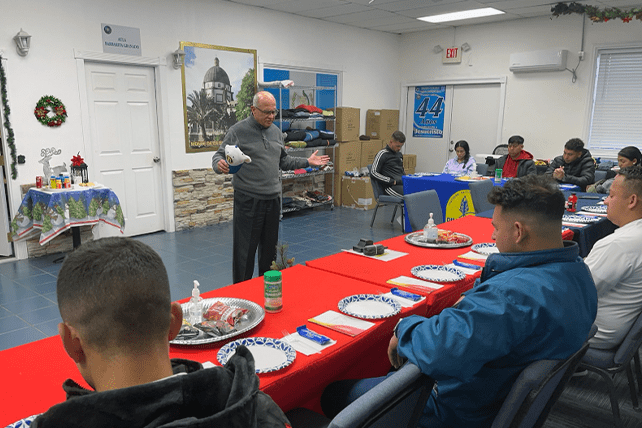Like other migrant ministries, Navarro has faced accusations that he’s “promoting illegal immigration” despite his close partnership with the government. And on several occasions, Navarro said people have taken photos of his license plate, which he interpreted as “a threat.”
Ministerio Golán’s small-scale ministry, which operates without government funding, differs from many other religious shelters at the border that received substantial federal government funding during the Biden administration. In line with a Southern Baptist perspective on separation of church and government, Navarro said the ministry has relied on donations, either money for its $7,500 monthly budget or material support, from church groups including Fellowship Southwest, Urban Strategies, World Relief, World Vision, Salvation Army, Send Relief, the Southern Baptists of Texas Convention, the Cooperative Baptist Fellowship, Serve Now, Church World Service and local restaurants.
“When you take all the politics out of it, and you just focus on the call,” Elket Rodríguez, who supports Ministerio Golán through Fellowship Southwest, an ecumenical Christian network in Texas, Oklahoma and Arizona originally founded by the Cooperative Baptist Fellowship, said, “it is an opportunity for the church to grow. It is an opportunity for the love of God to be spread,” explaining that following the biblical call to serve your neighbor means accepting “we do not get to choose who is the person we’re gonna help.”
“I’ve been called to do a ministry that transcends earthly governments,” Rodríguez said.
Navarro, who identifies as a theological conservative, and his church are determined to cling to their beliefs no matter how unpopular. From his desk, with large U.S. and Israeli flags behind him, Narravo told RNS of his support for migrants and Israel, “I’m just trying to stay away from what political correctness is.” He explained, “ I’m doing what I’m doing because of my convictions.”
At the December Bible study and worship service, Navarro told the group of migrants that they were the most important people in the room, besides Jesus of course.
After the opening worship songs and Scripture reading, the church formally welcomed the migrants to the U.S. At dinner, Navarro had asked all of the migrants where they were from so he and his team were prepared to feature flags, slides and regional music for each group during the service.
That night, Navarro told his church, “Every day until Christ comes we will have dinners.” Since the Trump administration’s blockage of asylum cases, those dinners have shrunk though.
For the migrants who planned to come to the U.S. now stuck in Mexico or journeying farther south, Navarro hopes churches in those areas will not see those migrants as “a burden” or “a threat.”
“This is a good moment for churches in Mexico to step up and do something,” he said.
This article originally appeared here.

